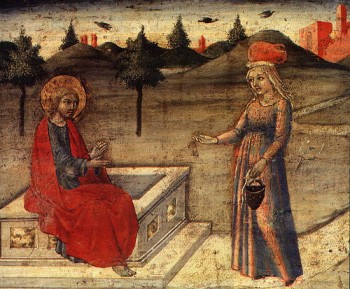On October 30th, 1938, a radio broadcast on the CBS Radio station "The War of…
Why the Local Well Was the Facebook of Biblical Villages
As I like to say, women of today and women of biblical times have more in common that we might realize.
Community, for instance. We might stay in touch with our friends and family in a different way, but we do it for the same reasons.
Consider the local village well and Facebook. They don’t seem to have much in common until we look a little more carefully.
Water — as always — was of vital importance in the Bible as it is today. It was just harder to get than turning on a tap. Women needed water in ancient Israel not only for drinking, irrigation, washing, and cooking, but also for religious ritual. Because of its importance, water was a common spiritual metaphor. From the great flood, to the parting of the Red Sea, to Jesus walking on the Sea of Galilee—water had huge significance.
It comes as no surprise, then, that the well was the most important place in the ancient village. We see plenty of important happenings at village wells in both the Old Testament and the New:
Isaac’s wife, Rebekah, was found at a well.
Moses and Zipporah met at a well, as did Jacob and Rachel.
Jesus stopped at a well in Samaria and proclaimed himself the Messiah to a lone woman.
The well was the center of a village’s social and economic life. Early every morning, before the heat of the day, women would go to the well to fetch water in heavy clay jars, sometimes carrying it long distances back to their homes.
Using just a little imagination, we can surmise that friends used the well to check in with each other before starting their day of work —much as many of us do with our social media sites today. Maybe they even made a plan to go at the same time so they could have something to look forward to each morning before they started their many chores. Surely, they were eager to tell friends any good news they had—who was betrothed, who with child. They asked for prayers for aging parents or sick children. They mourned with each other or rejoiced.
Kind of like we do with social media. We check in with our friends, share news, discuss family and politics. Just like Facebook, there was no doubt some vice at the well—gossip, snubbing, some not-so-subtle bragging. Probably some unfriending happened on the long walk home after the water was drawn. We can be certain that information was passed along from house to house until the whole village had had a chance to like, comment, or share each bit of news.
Next time you check in with friends online– be it first thing in the morning, on our lunch hour, or late at night–take a moment to remember these women of the Bible that were not so very different from us.
If you want to know more about Biblical women, consider The Living Water Series:

Book 1 of The Living Water Series
Mara is a desperate Samaritan girl struggling to keep her family alive in the face of starvation and the threat of exile from their strict village. When a mysterious Jewish teacher transforms her mother at Jacob’s well, Mara hopes for a better life—until her mother’s past sins lead to a brutal stoning.
Only Mara can save her dying mother, but she’ll have the help of an unlikely friend: Shem, a hot-tempered young man on the run from the Romans. Shem risks capture to help Mara search for the man that Samaritans call the Taheb, the Restorer. Together, they travel dangerous roads into the hostile territory of Galilee. Their journey to the Taheb brings them burgeoning faith, unexpected love, and unimaginable heartbreak.
Only Mara can save her dying mother, but she’ll have the help of an unlikely friend: Shem, a hot-tempered young man on the run from the Romans. Shem risks capture to help Mara search for the man that Samaritans call the Taheb, the Restorer. Together, they travel dangerous roads into the hostile territory of Galilee. Their journey to the Taheb brings them burgeoning faith, unexpected love, and unimaginable heartbreak.
Endorsements
Mara is an unforgettable character, and the writing is sharp. Landsem’s fresh interpretation of the familiar biblical story of Jesus and the woman at the well will be well received by fans of T. Davis Bunn. An excellent first outing by a promising writer. Library Journal
“…an interesting and imaginative work; highly recommended.” The Historical Novel Society


